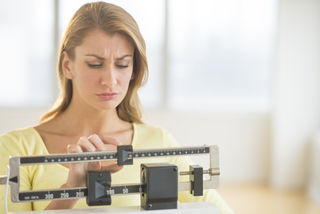Self-Esteem
Step Away From The Scale (and Never Go Back On)
Disturbing research reveals what we really learn when we weigh ourselves.
Posted December 10, 2015

Scales are ubiquitous in American households. They are expected objects in a bathroom landscape. Few people think twice when they happen upon one. You may even have one in your own bathroom. However, when we actually step onto the scale, this innocuous-looking object becomes something far more sinister.
In our culture, where thinner is always better, the scale doesn't just tell us what we weigh; It has become a measure of our self-worth, an oracle determining whether we will have a good day or a bad day, and the judge of whether we are "good" or "bad."
The effects of stepping on the scale may be particularly detrimental for teens and young adults just developing a sense of self and particularly vulnerable to the development of eating disorders. Most young adults have access to a scale, if not in their own home then in the homes of friends, at the mall, or even in a school locker room. Many regularly monitor their weight by stepping on a scale; some may have even been encouraged to do so by parents or a pediatrician. In the midst of the “obesity epidemic,” self-weighing is often seen as an innocuous, effective means of weight control. However, new research highlights the risky consequences of self-weighing during the critical period of transition from adolescence to young adulthood.
In a study published in the Journal of Nutrition Education and Behavior, Pacanowski et al (2015) analyzed data from the Project Eating and Activity in Teens and Young Adults (Project EAT), a longitudinal study of male and female adolescents and young adults who were assessed at three time points, beginning in middle or high school, and followed for 10 years. The analysis included 1,902 participants (819 males and 1,083 females). More than two-thirds of the sample would be classified as having “normal” weight. Participants were asked to rate how strongly they agreed or disagreed with the statement “I weigh myself often.” The researchers also gathered data on weight, body-mass index, weight disparity (the difference between self-reported ideal weight and actual current weight), body satisfaction, weight concern, depression, and self-esteem.
Results of this study indicate that for both males and females, there was no association between self-weighing and either weight or BMI. This calls into question the common belief that self-weighing leads to weight loss or maintaining a lower weight. If that were true, then participants who regularly weighed themselves would weigh less than those who did not. What the researchers did find was that, for both males and females, self-weighing was associated with greater concern about weight. Females who weighed themselves regularly also experienced more dissatisfaction with their bodies, more depressive symptoms, and lower self-esteem.
Based on these results, it appears that stepping on the scale doesn’t help people lose weight—but it may make them feel bad about their bodies through increased weight concern and body image dissatisfaction; feel bad about themselves; and even feel depressed.
The scale, then, comes with plenty of risk but no clear benefit.
The fact is, we don’t need a scale to tell us how our body is doing. If we are attuned to our body, we will generally know if we have gained or lost weight. It is also important not to let our weight define who we are. Weight and body-mass index (BMI) are pretty lousy indicators of health—and even worse indicators of moral character.
Reference: Pacanowski CR, Loth KA, Hannan PJ, Linde JA, Neumark-Sztainer DR. (2015). Self-Weighing Throughout Adolescence And Young Adulthood: Implications for Well-Being. Journal of Nutrition Education and Behavior, 47 (6), 506-515.
Want more of Dr. Conason and Mindful Eating? Check out her new blog https://www.tumblr.com/blog/theantidietplan, her website http://www.drconason.com, follow her on Twitter https://twitter.com/ConasonPsyD, and like her on Facebook https://www.facebook.com/Alexis-Conason-PsyD-197541507107724/.


